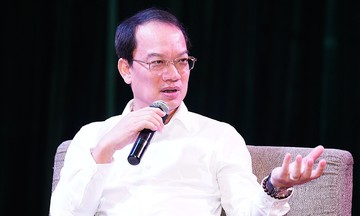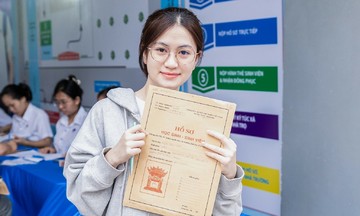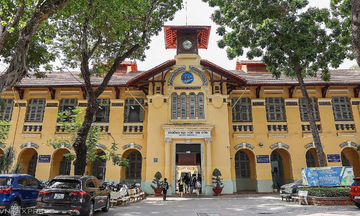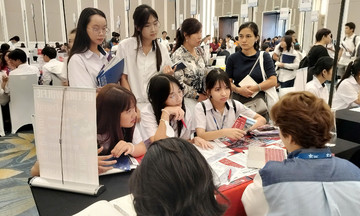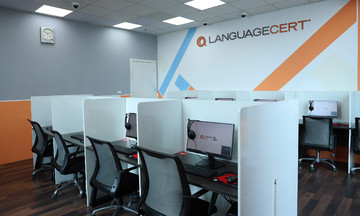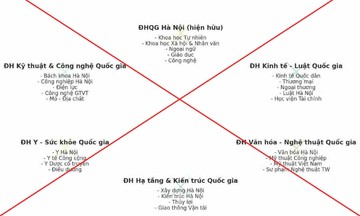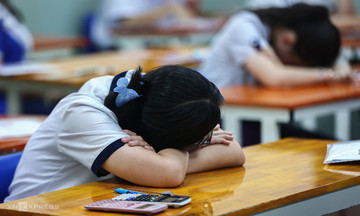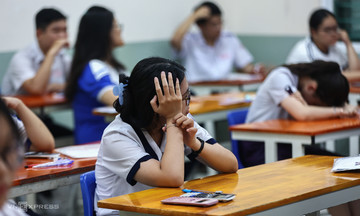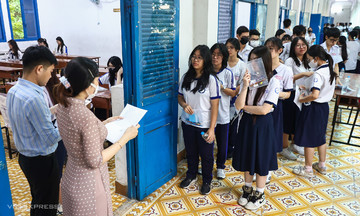Nguyen Kim Anh, a 12th-grade student in Tu Liem, Hanoi, described the buzz among her classmates after hearing about the Ministry of Education's proposal to eliminate transcript-based admissions and limit the number of university applications per student last week.
"Perhaps only high-achieving students targeting top universities are indifferent. Many of my classmates, including myself, disagree with this," Kim Anh said. "Unlimited applications give borderline students more opportunities."
Bui Huy Hoang, a 12th-grader at Le Hong Phong High School for the Gifted in Ho Chi Minh City, agreed. He explained that students currently list universities in order of preference, including "safety schools" to avoid failing to get in. Limiting applications reduces these chances, intensifying the competition.
Hoai Nam from Hai Phong concurred, adding that limited applications would increase pressure due to the complexity of prioritizing choices.
"The scoring system is already complicated, and easy to miscalculate. Limiting choices makes it even harder," Nam observed.
 |
High school seniors in Ho Chi Minh City taking the 2025 national high school graduation exam. Photo: Quynh Tran |
High school seniors in Ho Chi Minh City taking the 2025 national high school graduation exam. Photo: Quynh Tran
This year, students submitted a total of 7.6 million applications, averaging nearly 9 per student, compared to 5 in previous years. Applications of 10 or more account for about 30%. The Ministry of Education and Training, along with representatives from several universities, believe this needs to be limited.
At the 2025 university admissions conference, Minister Nguyen Kim Son argued that unlimited applications "do not necessarily offer more opportunities."
"It can confuse and overwhelm students, turning perceived opportunity into difficulty," the Minister said.
Professor Nguyen Tien Thao, Director of the Department of Higher Education, stated that nearly 30% of students apply to over 10 universities but rarely gain admission through their lower preferences. Most apply "just to be safe" or "for fun."
Professor Thao believes this diminishes students' focus and motivation, as they think, "If not this university, then another." Statistics show that those who submit over 10 applications are less likely to enroll, suggesting they had other plans and only applied for the sake of "getting accepted."
"This leads to a waste of resources – application fees, the system itself, and university resources," Professor Thao said. "Students should identify clear goals, fostering genuine interest in their chosen field, rather than applying aimlessly."
Dr. Vo Van Tuan, Vice President of Van Lang University, noted that each admissions season, he sees students applying across diverse fields, from natural sciences to humanities and even healthcare. Unsure of their interests, they apply broadly but without genuine intent. He, therefore, supports limiting applications.
Dr. Nguyen Trung Nhan, Head of the Training Department at Ho Chi Minh City University of Industry, and Master Nguyen Minh Tung, Head of Admissions and Student Affairs at the Vietnam Aviation Academy, believe limiting applications encourages careful consideration and prioritization.
Dr. Nhan added that it would also reduce ghost applications, simplifying the verification process for universities.
These two experts proposed a maximum of 10 applications, while Dr. Vo Van Tuan suggested 3-5 if high schools effectively guide students' career choices. Universities should also announce admissions plans early for students to prepare.
Conversely, Associate Professor Vu Duy Hai, Head of Admissions and Career Orientation at Hanoi University of Science and Technology, argued for allowing students autonomy in the number of applications.
"This doesn't significantly impact the admissions system, increases students' chances, and avoids unfortunate outcomes," he said.
Hanoi University of Science and Technology assists 65 northern universities in verifying applications. According to Professor Hai, numerous applications don't pose a technical challenge; the issue lies in the number of admissions methods.
"Instead of limiting applications, universities should consider reducing admissions methods, particularly ineffective ones," Professor Hai suggested.
Duong Tam - Le Nguyen



